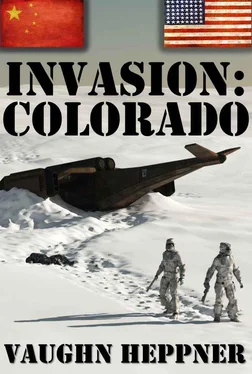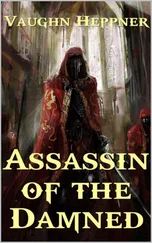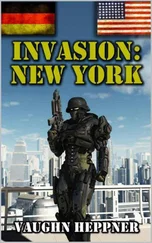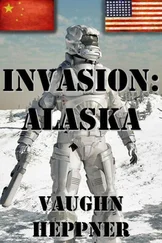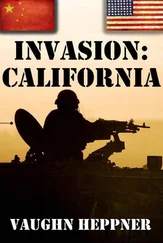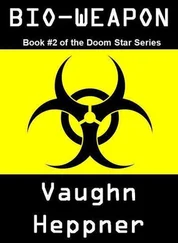“Disease began to do its work, while angry Russian peasants bushwhacked French stragglers. Swift-riding Cossacks harried the French flanks. Soon the harsh winter weather arrived. Sickness, hunger, the punishing cold and battle losses eventually destroyed the Grand Army. Napoleon barely escaped with his life, and his legend of invincibility had been shattered. The Russian plan had worked due to luck and persistence.”
Tom pursed his lips. “Are you saying we should pull back deeper into the northern prairies?”
Stan tapped the map in the e-reader. “I’m saying we should be cagier in our approach. Look, we’ve fought the summer and autumn battles. We took grim losses, but the main U.S. Army still exists. We’ve already traded space for time and now winter approaches.”
“The Chinese will just keep on marching deeper into the Great Plains,” McGraw said, “cutting our nation in half. The Chinese are better supplied than Napoleon ever was.”
“Look at the map,” Stan said. “Do you see all the space they control? I’ve read reports and I know Americans are turning into partisans. They’re becoming like the Russian peasants, cutting off enemy stragglers and blowing up supplies. That costs China soldiers, weakening their overall Army as they put guards everywhere. Look at the length of the Mississippi River. The Chinese are using troops to guard it, too. That pulls out yet more soldiers from their advancing fronts.”
“They still have far more soldiers than we do,” McGraw said.
“It’s the Battle of Borodino time,” Stan said with drunken certainty. “But with a German World War II twist.”
“Meaning what?” McGraw asked.
“In 1812, the Russians strengthened their army at Borodino by building redoubts: log barricades. Those redoubts were force multipliers for the troops behind them. It meant they could face the French charge. We need to build a Great Plains defensive line and throw every Militiaman Mr. Harold has gathered behind them. Of course, we should stiffen those Militiamen with Regular Infantry and—”
“And tanks,” McGraw said.
“No!” Stan said. “That’s where you change up the historical parallel with a German WWII idea.”
McGraw frowned, but finally nodded. “I’m listening.”
“We have to mass all our tanks and mobile artillery into one big fist,” Stan said. “That’s what the Germans did for the invasion of France in 1940. Did you know that the French and British had more tanks than the Germans did in that swift historical campaign? Some of the Allied tanks were better than the German tanks. The German advantage was concentration. Instead of spreading out their tanks everywhere, they put them altogether. It was the difference between slapping a man in a fight and punching him in the face. We have to punch the Chinese in the face with all our tanks in one spot.”
“Bah!” McGraw said.
Stan stared at him. “It’s a risk, a big risk. But I think this is the time to attempt it. We need to use the Rockies or the Mississippi against them. By massing all our extra troops onto the defensive line, and trusting those Militiamen to hold for a time, we wait with the last U.S. Tank Army. That Tank Army or Army Group has to be lavishly supplied with everything we have left. With it, we punch through a Chinese or South American weak spot and encircle a significant portion of the Chinese Army. We put them into a cauldron and annihilate their troops. That’s also the right place to use the Behemoth tanks.”
Slowly, McGraw shook his head. “It’s a bold plan. That part I like. But it puts too much trust on the Militiamen to hold the line. Too many of them have folded—they have run away in battle—for me to trust the fate of the United States on them.”
“You asked me my idea,” Stan said. “I think we have to find a spot somewhere to go on the offensive. With what we have, we have to concentrate our best troops in one key spot. Tom, you and I both know that you don’t win a war by defending. I have to believe that holding onto such massive amounts of territory must be weakening the Chinese. The American people won’t just lie down and accept occupation.”
McGraw pursed his lips, becoming thoughtful for a time. Finally he said, “That’s a lot of movement, pulling out armor all across the Great Plains and shipping it to one area. I’m not sure we’d have the time to pull it off.”
“It’s not rocket science,” Stan said, “but to do as I suggest would take a lot of confidence for any leader to attempt. The normal thing is to hold onto what you have with your strength spread out evenly, defending everything. Frederick the Great had a saying for that. ‘He who defends everything defends nothing.’ Sometimes, you have to gather your strength in one spot and take a risk.”
McGraw glanced at his latest shot glass. He let his chin droop and rest on his chest. His eyes were half-lidded. “There’s more to your idea, isn’t there?”
“What do you mean?”
“Don’t give me that, old son. You have this all written down somewhere. I bet you’ve come up with a thousand details.”
Stan sucked in his lips. They felt even more numb than before, almost as if a dentist had sneaked in and given him a shot of Novocain. Suddenly, Tom didn’t look so drunk anymore. The man was huge. How much alcohol could the general absorb before he became sloppy drunk and threw glasses at the wall? Had that been a show earlier?
“Speak up, Colonel. I can’t hear you.”
“I might have written a few things down,” Stan admitted.
Tom stood up. “I want to see them.”
“Now?” asked Stan.
“I can’t think of a better time.” Tom McGraw grinned, and he winked at Stan. “I figured you’d have something up your sleeve, old son. I also know that a drunken man has a harder time keeping quiet, and talking to a drunk makes it even harder. Listening to you, I realize I’ve come to the right place for a sweeping idea on how to fix our situation. Are you ready?”
Stan kept blinking. Well I’ll be damned .
“I said: are you ready?”
“Yes, sir,” Stan muttered. He shoved up to his feet. “If you’ll follow me…”
RIO GRANDE NATIONAL FOREST, COLORADO
Jake Higgins trudged up a pine-needle-littered slope during daylight. These past weeks he’d slept during the day and traveled at night. Now that he moved under towering evergreens, he’d decided to switch it back to normal.
It had been a week since the ambush east of Alamosa. Jamal and Alabama Ted had stuck with him for two days longer. It had been terrifying: a crawl and wait, watch and then crawl again. Ted had finally crapped out, refusing to go any farther.
“We’re almost past Alamosa,” Jake had said.
Ted had rolled over, closed his eyes and refused to say another word.
In the end, Jamal had dragged Jake away. The two of them kept going. They made it west of Alamosa and kept trudging. He’d lost Jamal when he stepped on a landmine. It killed him instantly. That part was good. He’d gone without pain. The wretched part was that pieces of Jamal hit Jake in the chest. Seeing the man’s mangled finger cling to him—Jake had fallen to this hands and knees and vomited. He’d crawled blindly for a time, making it somehow through the minefield. The only thing that had consoled him in the end was that he knew he’d see Jamal again in heaven someday.
Yeah, Jamal’s death had been the worst. He missed the man’s cheerful attitude and he missed Jamal’s endurance. He’d been the toughest, after the lieutenant.
As he trudged up the mountain slope, slipping over pine needles—one time he went down on a knee—Jake wiped sweat out of his eyes. He was thin, hungry and growing weaker every day. He wore Chinese boots, having stolen one of the flyers’ pair. If he’d had his old worn boots—no way, he would have stopped because of bleeding feet.
Читать дальше
